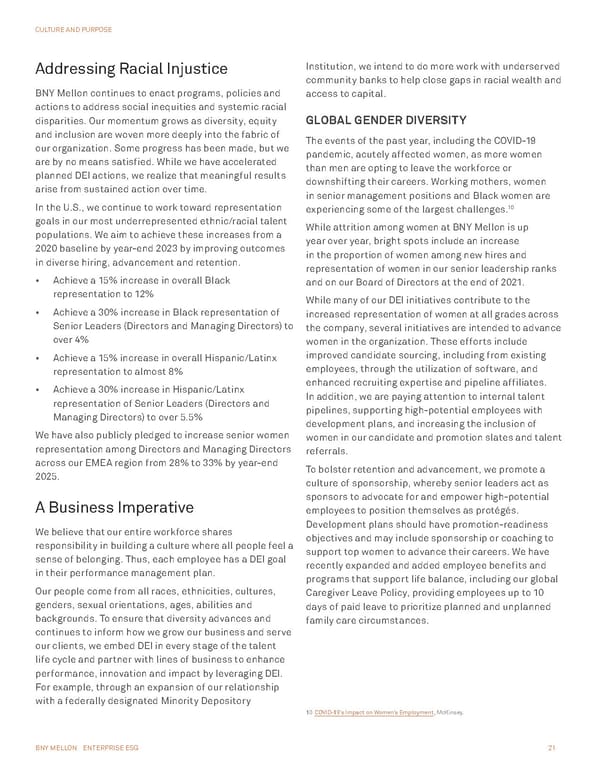BNY MELLON ENTERPRISE ESG 21 CULTURE AND PURPOSE Addressing Racial Injustice BNY Mellon continues to enact programs, policies and actions to address social inequities and systemic racial disparities. Our momentum grows as diversity, equity and inclusion are woven more deeply into the fabric of our organization. Some progress has been made, but we are by no means satisfied. While we have accelerated planned DEI actions, we realize that meaningful results arise from sustained action over time. In the U.S., we continue to work toward representation goals in our most underrepresented ethnic/racial talent populations. We aim to achieve these increases from a 2020 baseline by year-end 2023 by improving outcomes in diverse hiring, advancement and retention. • Achieve a 15% increase in overall Black representation to 12% • Achieve a 30% increase in Black representation of Senior Leaders (Directors and Managing Directors) to over 4% • Achieve a 15% increase in overall Hispanic/Latinx representation to almost 8% • Achieve a 30% increase in Hispanic/Latinx representation of Senior Leaders (Directors and Managing Directors) to over 5.5% We have also publicly pledged to increase senior women representation among Directors and Managing Directors across our EMEA region from 28% to 33% by year-end 2025. A Business Imperative We believe that our entire workforce shares responsibility in building a culture where all people feel a sense of belonging. Thus, each employee has a DEI goal in their performance management plan. Our people come from all races, ethnicities, cultures, genders, sexual orientations, ages, abilities and backgrounds. To ensure that diversity advances and continues to inform how we grow our business and serve our clients, we embed DEI in every stage of the talent life cycle and partner with lines of business to enhance performance, innovation and impact by leveraging DEI. For example, through an expansion of our relationship with a federally designated Minority Depository Institution, we intend to do more work with underserved community banks to help close gaps in racial wealth and access to capital. GLOBAL GENDER DIVERSITY The events of the past year, including the COVID-19 pandemic, acutely affected women, as more women than men are opting to leave the workforce or downshifting their careers. Working mothers, women in senior management positions and Black women are experiencing some of the largest challenges. 10 While attrition among women at BNY Mellon is up year over year, bright spots include an increase in the proportion of women among new hires and representation of women in our senior leadership ranks and on our Board of Directors at the end of 2021. While many of our DEI initiatives contribute to the increased representation of women at all grades across the company, several initiatives are intended to advance women in the organization. These efforts include improved candidate sourcing, including from existing employees, through the utilization of software, and enhanced recruiting expertise and pipeline affiliates. In addition, we are paying attention to internal talent pipelines, supporting high-potential employees with development plans, and increasing the inclusion of women in our candidate and promotion slates and talent referrals. To bolster retention and advancement, we promote a culture of sponsorship, whereby senior leaders act as sponsors to advocate for and empower high-potential employees to position themselves as protégés. Development plans should have promotion-readiness objectives and may include sponsorship or coaching to support top women to advance their careers. We have recently expanded and added employee benefits and programs that support life balance, including our global Caregiver Leave Policy, providing employees up to 10 days of paid leave to prioritize planned and unplanned family care circumstances. 10 COVID-19’s Impact on Women’s Employment , McKinsey.
 BNY Mellon ESG Report Page 20 Page 22
BNY Mellon ESG Report Page 20 Page 22